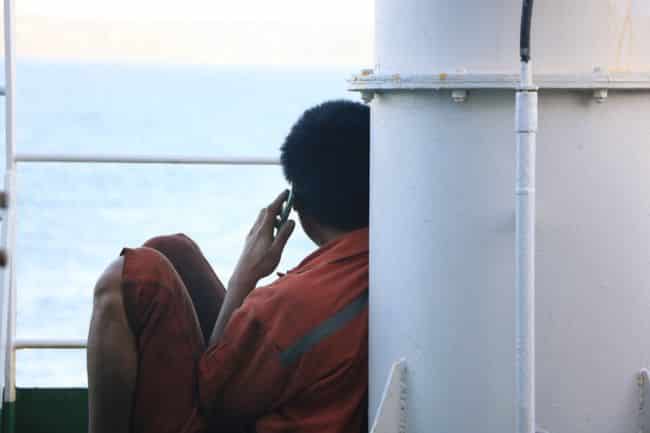
[ad_1]

Inmarsat, the world leader in global, mobile satellite communications, has further showcased its commitment to crew welfare by sponsoring a new report exploring the future of seafaring to 2050. The report offers recommendations on how shipping, training institutions and welfare services can respond to the changing needs of tomorrow’s seafarers.
The thought-provoking study, ‘A fair future for seafarers?’, has been prepared by maritime innovation consultancy Thetius. It has been published with shipping’s COVID-19 crewing crisis yet to be resolved. Taking a view of the shipping industry to 2050, the report suggests epidemics and pandemics may become more common, predicts that crew safety, fatigue and harassment issues are unlikely to recede in the short term, and foresees the potential for seafarer abandonment and criminalisation as growing problems that need to be addressed.
If such scenarios appear bleak, they also highlight connectivity as a necessity. “Seafarers in 2050 will likely have greater interaction and engagement with teams of people ashore,” according to the report. Shipping economics and carbon emission strategies point to shorter port stays. Welfare services will become more digitally focused than physical, face-to-face contact. Lower crew numbers and shorter shore leaves will also mean less reliance on seafarer centres, therefore online charity outreach services will grow in vital importance.

Image Credits: Chan Min Thet | seafarerswelfare.org
“Drawing on recent experience, fast-changing digital landscapes and testimony from industry authorities, this report offers a clear vision of the critical role connectivity and technology will play in crew welfare in the coming years,” says Ronald Spithout, President, Inmarsat Maritime.
Thetius identifies a number of technologies that are critical for future crew welfare and Inmarsat supports their early adoption.
“The 2020-21 pandemic may come to be seen as a tipping point for telemedicine,” says Spithout. The report highlights how fatigue monitoring and management systems will likely replace manual logging of rest hours. Following the 2020 Crew Welfare Open Innovation Challenge, Inmarsat and Shell Shipping and Trading are sea trialling the software capability provided by Eupnoos and Workrest to enable intelligent fatigue management from the data collected by wearable technology.
In 2050, seafarers will have been born into the digital era, Gardner and Chubb note, but the use of artificial intelligence (AI), 3D printing, and extended reality (XR) technology onboard will still demand higher levels of technical training. Signs of change are also apparent here, with the Isle of Man Registry working with start-up Tapiit to create an app to live stream training, and organisations such as Ocean Technology Group delivering maritime training using VR headsets.
“We are fully aware of the sacrifices our seafarers continue to make to keep the world economy running,” says Spithout. “This new report includes important proposals for the creation of a global seafarer advocacy organisation and an urgent strategic review of local seafarer services. For its part, Inmarsat is doing everything in its power to support our seafarers. We are doing so through enhancing connectivity and the digital services that support safety, continuous professional development and crew welfare as well as continuously working in collaboration with charities, ship owners and managers to provide enhanced welfare services.”
The launch of this report also comes at a time when Inmarsat is preparing to launch a refreshed version of its Fleet Xpress portal, Fleet Hotspot, in the third quarter of 2021. Crews access Fleet Hotspot independently of a ship’s operational bandwidth.
“This updated service will include exciting new features for crews, including the ability to create their own ‘Fleet Hotspot’ account and use credit across multiple devices,” says Spithout.
The new report can be downloaded here.
Press Release
[ad_2]
This article has been posted as is from Source